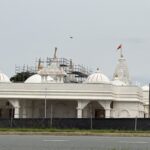Pittsburgh, Pennsylvania: Over 5,000 devotees from across the United States and Canada gathered at the Sri Venkateswara Temple in Pittsburgh, Pennsylvania, for a four-day annual religious event from July 31 to August 3, 2025. The celebration, held under the theme “Ashtakshari Homam,” brought together devotees in a vibrant display of devotion and community spirit.
Throughout the event, participants engaged in a series of sacred rituals including Pancha Sukta Homam, Purusha Suktam Homam, Parivara Homam, and Prayaschitta Homam. The atmosphere was infused with traditional Vedic chanting and ceremonial fire offerings. Each sponsoring devotee had the opportunity to perform personal prayers under the guidance of a priest and received a pendant to continue their prayers at home. This year, over 1,000 individuals sponsored the Homams, with around 250 participating in person.
In an exclusive interview with South Asian Herald, on August 3, Chairman of the Sri Venkateswara Temple, Nageswara Rao, shared “For the past four days, we have been celebrating our annual religious function. As part of this, we conducted the Ashtakshari Homam for Lord Venkateswara. It is a highly auspicious ritual that offers spiritual upliftment and helps remove all obstacles. It is believed to bring prosperity, good health, and a long life to everyone.”
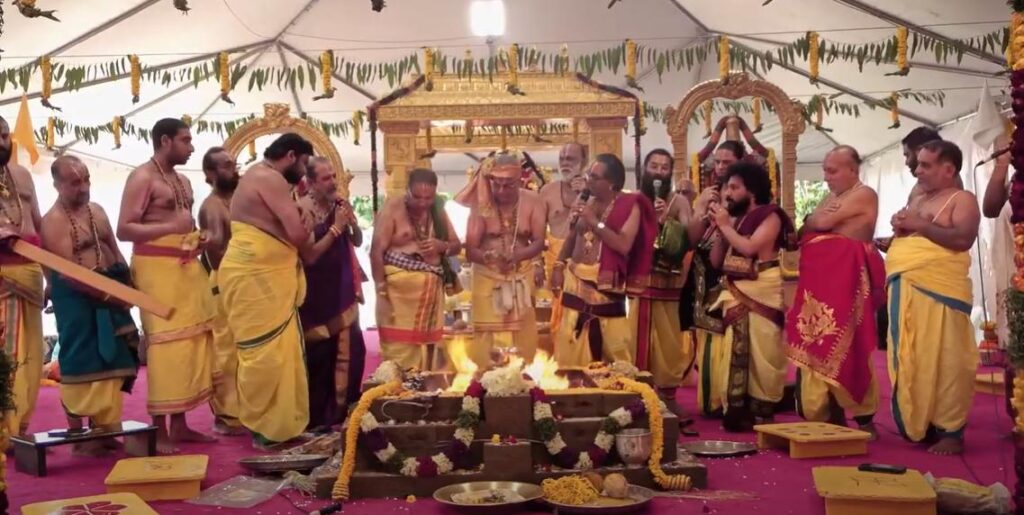
According to Rao, the elaborate rituals were led by 18 priests, including those from the temple as well as guest priests.
Consecrated on November 17, 1976, the Sri Venkateswara Temple in Pittsburgh holds the distinction of being the first traditional Hindu temple established in North America, explained Rao. Since its inception, it has offered daily prayers and traditional rituals without interruption, remaining open from morning to evening year-round, he said.
“It’s a blessing that we are at the crossroads of the temple’s history as we enter into the 50th year of our celebration,” President of the Executive Committee for 2024–25, Ramkumar Midhe, told South Asian Herald.
Midhe said that the temple was consecrated with support from the Tirumala Tirupati Devasthanams, which provided both the idols and guidance. Since then, the Pittsburgh temple has grown into one of North America’s leading spiritual centers.
He emphasized the temple’s role in shaping the landscape of Hindu religious life in the U.S., stating that many newer temples across North America have looked to Pittsburgh for guidance on religious practices and management.
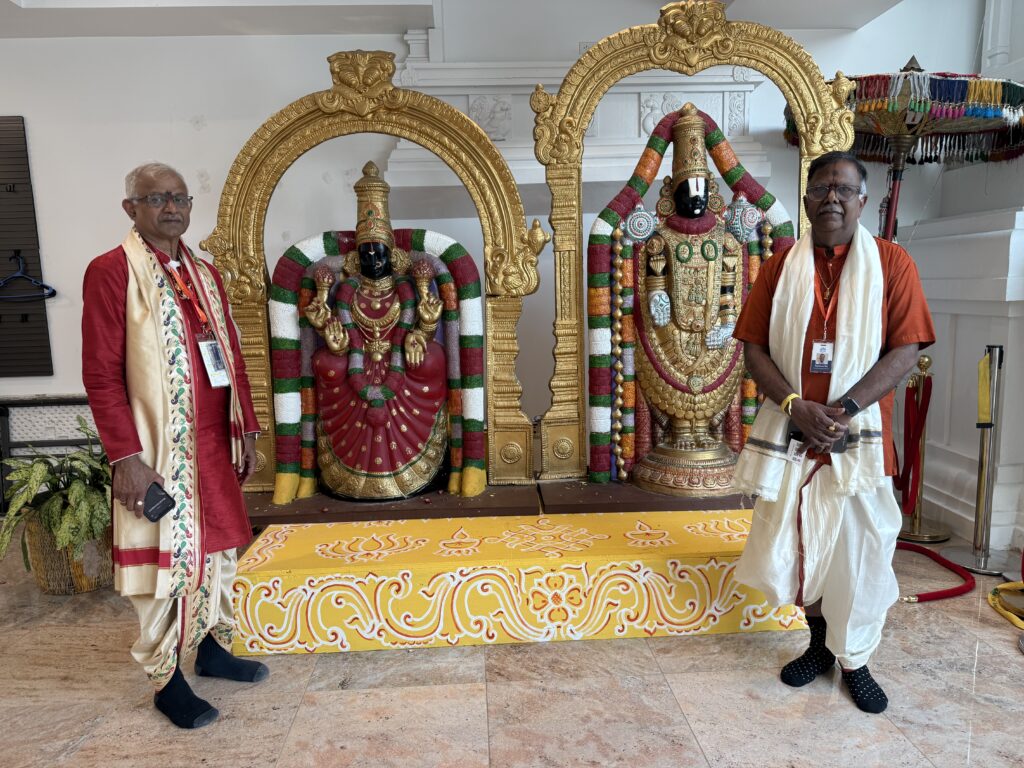
In addition to Indian devotees, people of Indian descent from countries such as Sri Lanka, Malaysia, Bhutan, Fiji, and Nepal also participate in the temple’s events, reflecting the temple’s significance in the global Indian diaspora, he pointed out.
According to Midhe, the temple adheres strictly to Pancharatra Agama traditions and has been sustained by a dedicated volunteer base. Many of these volunteers go on to serve in leadership roles on the management and executive committees.
“Our community is growing,” he said adding that Pittsburgh has a vibrant Indian community, as Indians are working in financial, healthcare, and other sectors.
In addition to religious activities, the temple supports Veda Patashalas in India to promote the preservation and teaching of the four Vedas, Rig Veda, Yajur Veda, Sama Veda, and Atharva Veda.
Noting that this year’s theme “Ashtakshari Homam,” was to “propitiate” Lord Vishnu, Midhe added “So, we chanted that mantra. We had homams from that mantra in five different sessions, starting from Friday morning till Sunday morning.”
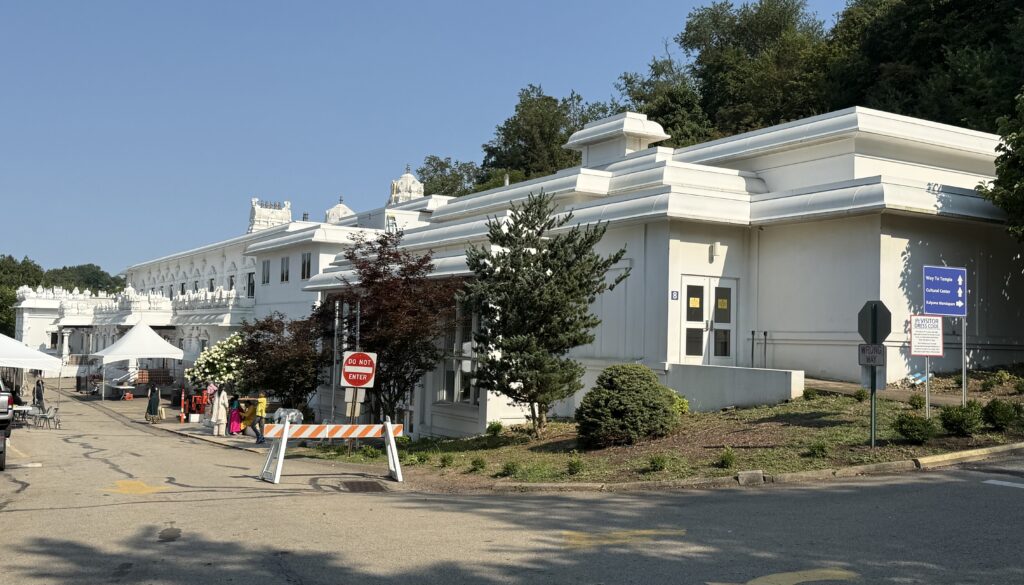
Beyond its religious role, the temple is a vital part of the local community. It contributes to humanitarian efforts, supports food banks, and provides scholarships, both merit-based and need-based, within local school districts. Scholarship recipients are selected by school teachers.
Rao highlighted the economic impact of the temple on the surrounding area, noting that local governments recognize and support its contributions. Visitors to the temple frequently support hotels, restaurants, and car rental services, offering a boost to the local economy.
“We are making a living here, so we want to give back to the community. At the same time, we don’t want to forget our roots. We preserve our culture, uphold our traditions, and continue to propagate Sanatana Dharma to the next generations,” added Rao.
To foster connections with the next generation, Rao mentioned the temple runs Bal Vihar classes during the school year, where children learn different activities and Indian languages based on their family’s native tongue. The Bal Vihar classes run weekly during school months and take a break during the summer, replaced by youth camps that attract kids from across the country.
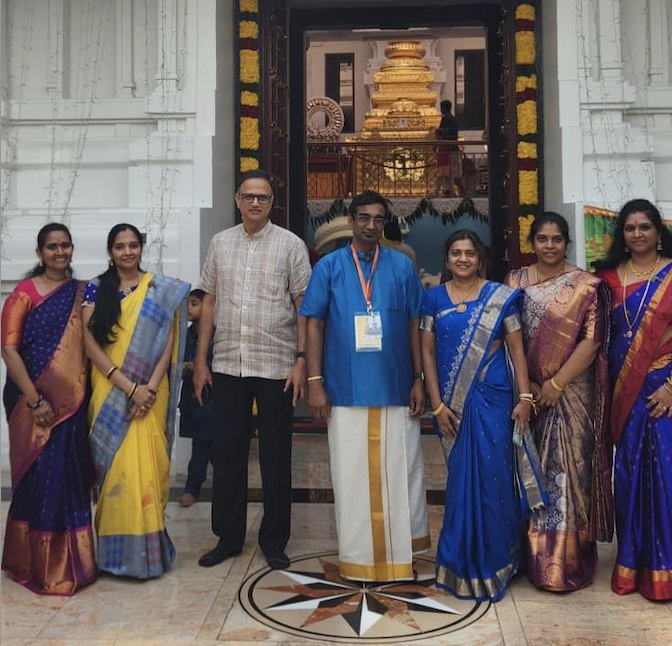
“Youth camps provide a secure environment for children, with vetted and cleared volunteers managing activities, including yoga, creative activities, and temple visits. The camps aim to engage children in traditional learning and foster a desire to return year after year, ensuring the preservation of cultural traditions,” said Rao.
Secretary of the Board of Directors, Murali Muruguswamy, said, “Later this year, we will begin celebrating the 50th anniversary of the temple, a major milestone in our spiritual and cultural journey.”
In addition to the traditional festivals, the temple celebrates several special religious festivities such as Brahmotsavam, Tiruppāvāḍa Seva, Sri Dhanvantri Homam, Kudarāi Valli / Nūru Thāda Utsavam, and Śrī SitaRama Kalyanam. The temple also conducts Śrī Tyāgarāja Ārādhanā, Śrī Purandara Dāsa Ārādhanā, Śrī Āzhwār Ārādhanā, Śrī Annamācārya Ārādhanā, and Swāti Tirunāl Ārādhanā, to honor the rich spiritual and musical heritage, he added.
During the Margazhi month, he said all 30 verses of the Thiruppavai are chanted daily, accompanied by Thiruppalliezhuchi, Thiruppallāndu, and the Adhyayana Utsavam (Rā / Pagal Pāthu) around Vaikunta Ekādaśī, all observed with deep devotion.
“I bow endlessly before the Lord, who has graciously blessed me with the opportunity to serve,” added Muruguswamy.





